June 26, 2015 •
Bill to Rework FEC Introduced in Congress
On June 25, 2015, a bill was introduced in the U.S. Congress to restructure the Federal Election Commission (FEC). House Resolution 2391, The Restoring Integrity to America’s Elections Act, would amend the Federal Election Campaign Act of 1971 to reduce […]
 On June 25, 2015, a bill was introduced in the U.S. Congress to restructure the Federal Election Commission (FEC).
On June 25, 2015, a bill was introduced in the U.S. Congress to restructure the Federal Election Commission (FEC).
House Resolution 2391, The Restoring Integrity to America’s Elections Act, would amend the Federal Election Campaign Act of 1971 to reduce the number of members of the FEC from 6 to 5. The bill would also revise the method of selection and the terms of service of members of the commission and alter the powers of the commission between the chair and the remaining members.
The sponsors of the bill are Jim Renacci (R-OH), Derek Kilmer (D-WA), Lou Barletta (R-PA), and John Carney (D-DE).
June 24, 2015 •
Lawsuit Alleges Presidential Debates Violate Election Law
On June 22, 2015, a lawsuit was filed against the Federal Election Commission (FEC) asking the court to direct the FEC to find the Commission on Presidential Debates (CPD) has made and accepted prohibited in-kind contributions when hosting presidential debates. […]
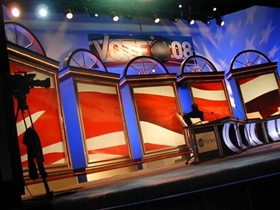 On June 22, 2015, a lawsuit was filed against the Federal Election Commission (FEC) asking the court to direct the FEC to find the Commission on Presidential Debates (CPD) has made and accepted prohibited in-kind contributions when hosting presidential debates.
On June 22, 2015, a lawsuit was filed against the Federal Election Commission (FEC) asking the court to direct the FEC to find the Commission on Presidential Debates (CPD) has made and accepted prohibited in-kind contributions when hosting presidential debates.
The plaintiff, Level the Playing Field, alleges the CPD violated 11 C.F.R. §110.13 by “staging candidate debates in a partisan manner and without pre-established, objective criteria.”
The lawsuit asserts, “[T]he CPD has rigged the rules governing who can be in the debates to ensure that no candidate other than the Democratic and Republican nominees will ever be invited to the debates. … [T]he CPD’s use of millions of dollars of corporate money to provide free televised campaign appearances to the Democratic and Republican presidential and vice presidential candidates violates [the Federal Election Campaign Act] – by making illegal corporate contributions to political candidates; by making illegal corporate campaign expenditures; by accepting illegal corporate campaign contributions; and by failing to disclose its contributions and expenditures.”
Level the Playing Field (LPF) is a nonprofit entity describing its purpose as the promotion of reforms allowing “for greater competition and choice in elections for federal office, particularly for the presidency and vice presidency.” Joining LPF in the lawsuit are the Green Party of the United States, the Libertarian National Committee, Inc., and Dr. Peter Ackerman.
Photo of a 2008 presidential debate stage by Ericci8996 on Wikimedia Commons.
April 10, 2015 •
North Dakota Democrats File FEC Complaint Over Foreign Contributions
Grand Fork Democrats in District 43 have filed a complaint with the Federal Election Commission (FEC) against state Republican officials and a political action committee (PAC) for receiving foreign campaign contributions. Gov. Jack Dalrymple, state Sen. Lonnie Laffen, and the […]
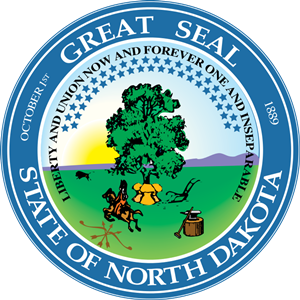 Grand Fork Democrats in District 43 have filed a complaint with the Federal Election Commission (FEC) against state Republican officials and a political action committee (PAC) for receiving foreign campaign contributions. Gov. Jack Dalrymple, state Sen. Lonnie Laffen, and the ND Oil PAC each reported receiving contributions from individuals with Canadian and/or United Kingdom addresses.
Grand Fork Democrats in District 43 have filed a complaint with the Federal Election Commission (FEC) against state Republican officials and a political action committee (PAC) for receiving foreign campaign contributions. Gov. Jack Dalrymple, state Sen. Lonnie Laffen, and the ND Oil PAC each reported receiving contributions from individuals with Canadian and/or United Kingdom addresses.
The complaint cites federal law and regulations prohibiting contributions from foreign nationals in federal, state, or local elections. North Dakota Secretary of State Al Jaeger has said he believes federal laws under the FEC apply to federal candidates, but do not apply to in-state, nonfederal candidates.
Democratic leaders also filed a request for an attorney general’s opinion on the interplay between federal and state law regarding foreign campaign contributions.
February 9, 2015 •
FEC Hearing Concerning McCutcheon Decision Scheduled for Wednesday
On February 11, the Federal Election Commission (FEC) will hold a public hearing regarding proposed rules in response to the U.S. Supreme Court decision in McCutcheon v. FEC. More than 30 witnesses have been scheduled to testify, including James Bopp, […]
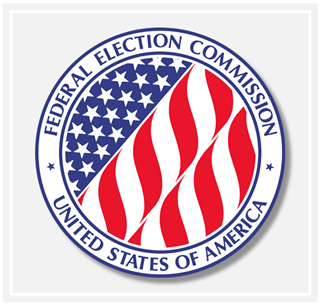 On February 11, the Federal Election Commission (FEC) will hold a public hearing regarding proposed rules in response to the U.S. Supreme Court decision in McCutcheon v. FEC.
On February 11, the Federal Election Commission (FEC) will hold a public hearing regarding proposed rules in response to the U.S. Supreme Court decision in McCutcheon v. FEC.
More than 30 witnesses have been scheduled to testify, including James Bopp, Jr. and Dan Backer, counsels for the McCutcheon case, and Shaun McCutcheon himself. A complete list of scheduled witnesses is available here.
The hearing, scheduled to begin at 8:15 a.m., is expected to last until at least 4:00 p.m.
February 3, 2015 •
Lobbyist Bundling Disclosure Threshold Increases to $17,600
On February 3, the Federal Election Commission (FEC) published its price index adjustments for expenditure limitations and lobbyist bundling disclosure threshold in the Federal Register. The lobbyist bundling disclosure threshold has increased to $17,600 for 2015 from $17,300 in 2014. […]
 On February 3, the Federal Election Commission (FEC) published its price index adjustments for expenditure limitations and lobbyist bundling disclosure threshold in the Federal Register. The lobbyist bundling disclosure threshold has increased to $17,600 for 2015 from $17,300 in 2014. This threshold amount is adjusted annually.
On February 3, the Federal Election Commission (FEC) published its price index adjustments for expenditure limitations and lobbyist bundling disclosure threshold in the Federal Register. The lobbyist bundling disclosure threshold has increased to $17,600 for 2015 from $17,300 in 2014. This threshold amount is adjusted annually.
Federal law requires authorized committees of federal candidates, leadership political action committees (PACs), and political party committees to disclose contributions bundled by lobbyists and lobbyists’ PACs.
February 3, 2015 •
FEC Adjusts Federal Contribution Limits for the 2015-2016 Election Cycle
The Federal Election Commission (FEC) has published the 2015-2016 election cycle contribution limits, which have been indexed for inflation. As required by the Bipartisan Campaign Reform Act of 2002, the FEC must adjust certain contribution limits every two years. The […]
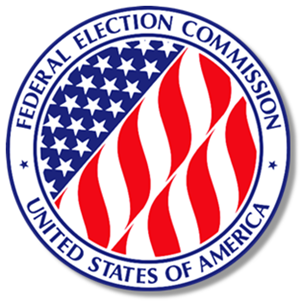 The Federal Election Commission (FEC) has published the 2015-2016 election cycle contribution limits, which have been indexed for inflation. As required by the Bipartisan Campaign Reform Act of 2002, the FEC must adjust certain contribution limits every two years.
The Federal Election Commission (FEC) has published the 2015-2016 election cycle contribution limits, which have been indexed for inflation. As required by the Bipartisan Campaign Reform Act of 2002, the FEC must adjust certain contribution limits every two years.
The individual and nonmulticandidate PAC contribution limit to federal candidates has increased from $2,600 to $2,700 for both primary and general elections, allowing for a total of $5,400 for a federal candidate.
The limits on contributions by individuals to national party committees has increased from $32,400 to $33,400 per calendar year. Individuals may now contribute $100,200 per calendar year to committees of a national political party for presidential nominating conventions, to committees of a national political party for preparation for and the conduct of election recounts and contests and other legal proceedings, and to committees of a national political party for the construction, purchase, renovation, operation, and furnishing of one or more buildings for party headquarters.
December 17, 2014 •
Ann Ravel Selected as Next FEC Chairwoman
Today, the Federal Election Commission elected Ann Ravel as its chairwoman. Ravel replaces Lee E. Goodman, who was appointed with Ravel to the commission in 2013. The chairmanship is a rotating, one-year position. No commissioner may serve as chair more […]
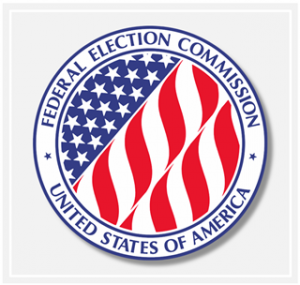 Today, the Federal Election Commission elected Ann Ravel as its chairwoman. Ravel replaces Lee E. Goodman, who was appointed with Ravel to the commission in 2013.
Today, the Federal Election Commission elected Ann Ravel as its chairwoman. Ravel replaces Lee E. Goodman, who was appointed with Ravel to the commission in 2013.
The chairmanship is a rotating, one-year position. No commissioner may serve as chair more than once during his or her term.
November 26, 2014 •
District Court Rules FEC Regulation Limiting Disclosure “Arbitrary, Capricious, and Contrary to Law”
On November 25, the United States District Court for the District of Columbia ruled corporations and labor organizations making electioneering communications are required to disclose all donors making contributions over $1,000. Under 11 C.F.R. §104.20(c)(9), the Federal Election Commission’s regulation […]
On November 25, the United States District Court for the District of Columbia ruled corporations and labor organizations making electioneering communications are required to disclose all donors making contributions over $1,000. Under 11 C.F.R. §104.20(c)(9), the Federal Election Commission’s regulation ruled invalid, disclosure was only required when made explicitly for the purpose of furthering electioneering communications.
In Christopher Van Hollen v. Federal Election Commission, the Court found the commission’s regulation “arbitrary, capricious, and contrary to law” and “an unreasonable interpretation of the [Bipartisan Campaign Reform Act (BCRA)].” 52 U.S.C. § 30104(f)(d)(E)–(F) of the BCRA does not require any preconditions for when to disclose donors making contributions over $1,000.
The Court ruled the commission’s regulation “serves to frustrate the aim of the statute because the introduction of a subjective test to the reporting regime creates an exception that has the potential to swallow the rule entirely. A donor can avoid reporting altogether by transmitting funds but remaining silent about their intended use.”
The case was brought in 2011 by U.S. Rep. Christopher Van Hollen.
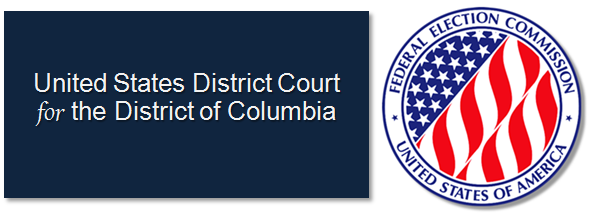
October 9, 2014 •
National Convention Committees May Accept Political Contributions Separate from Contributions Given to National Party Committees
Today, the Federal Election Commission (FEC) issued an advisory opinion allowing national convention committees to accept contributions separate from national party committees. The decision was supported by Democratic commissioner Ann Ravel and the three Republican commissioners, Lee Goodman, Caroline Hunter, […]
 Today, the Federal Election Commission (FEC) issued an advisory opinion allowing national convention committees to accept contributions separate from national party committees. The decision was supported by Democratic commissioner Ann Ravel and the three Republican commissioners, Lee Goodman, Caroline Hunter, and Matthew S. Petersen. The immediate effect is individuals may now contribute an additional $32,400 per calendar year to a convention committee beyond the $32,400 limit permitted to be given to committees of national political parties. The opinion holds that both the National Democratic Committee and the National Republic Committee, who requested the opinion, may each establish convention committees to raise and spend federal funds for convention expenses under separate contribution limits. The FEC found such convention committees qualify as “national committees” subject to their own contribution limits.
Today, the Federal Election Commission (FEC) issued an advisory opinion allowing national convention committees to accept contributions separate from national party committees. The decision was supported by Democratic commissioner Ann Ravel and the three Republican commissioners, Lee Goodman, Caroline Hunter, and Matthew S. Petersen. The immediate effect is individuals may now contribute an additional $32,400 per calendar year to a convention committee beyond the $32,400 limit permitted to be given to committees of national political parties. The opinion holds that both the National Democratic Committee and the National Republic Committee, who requested the opinion, may each establish convention committees to raise and spend federal funds for convention expenses under separate contribution limits. The FEC found such convention committees qualify as “national committees” subject to their own contribution limits.
Additionally, in a 4-2 decision, the Federal Election Commission (FEC) approved final rules concerning independent expenditures and electioneering communications by corporations and labor organizations. Ravel again joined the three Republican commissioners to pass the rules, which were created in response to the 2010 Citizens United v. FEC U.S. Supreme Court decision. They will be effective once they have been transmitted to Congress for a 30-legislative-day review period.
The FEC also approved rule-making and interim final rule responses to McCutcheon v. FEC.
October 9, 2014 •
FEC to Finalize Rules in Response to Citizens United
Today, the Federal Election Commission (FEC) is considering final rules concerning independent expenditures and electioneering communications by corporations and labor organizations. In response to the 2010 Citizens United v. FEC U.S. Supreme Court decision, the commission has written rules expected […]
 Today, the Federal Election Commission (FEC) is considering final rules concerning independent expenditures and electioneering communications by corporations and labor organizations. In response to the 2010 Citizens United v. FEC U.S. Supreme Court decision, the commission has written rules expected to be approved at today’s meeting. The rules will be effective once they have been transmitted to Congress for a 30-legislative-day review period. The FEC will also consider proposed rule-making and interim final rule responses to McCutcheon v. FEC.
Today, the Federal Election Commission (FEC) is considering final rules concerning independent expenditures and electioneering communications by corporations and labor organizations. In response to the 2010 Citizens United v. FEC U.S. Supreme Court decision, the commission has written rules expected to be approved at today’s meeting. The rules will be effective once they have been transmitted to Congress for a 30-legislative-day review period. The FEC will also consider proposed rule-making and interim final rule responses to McCutcheon v. FEC.
September 23, 2014 •
Tuesday Lobbying and Campaign Finance News Update
Lobbying “Bottom Line” in The Hill. Oklahoma: “State Capitol lobbyist Bart McSpadden dead at 46” by Mark Friedel in the Claremore Daily Progress. Campaign Finance “Democrats relying on big donors to win” by Kenneth P. Vogel and Tarini Parti in […]
 Lobbying
Lobbying
“Bottom Line” in The Hill.
Oklahoma: “State Capitol lobbyist Bart McSpadden dead at 46” by Mark Friedel in the Claremore Daily Progress.
Campaign Finance
“Democrats relying on big donors to win” by Kenneth P. Vogel and Tarini Parti in Politico.
“FEC Chairman Talks ‘Dark Money’ and the Fine Line Between Free Speech and Censorship” by Elizabeth Nolan Brown in Reason.com.
“Is there a right to contribute to out-of-state elections?” by William Baude in The Washington Post.
Massachusetts: “Massachusetts governor’s race has range of cash sources” by Steve Leblanc in the Portland Press Herald.
Massachusetts: “Pro-casino group ramping up campaign spending” by The Associated Press in the Boston Herald.
New Jersey: “N.J. assemblyman wants to end restrictions on campaign donations, lobbying: The Auditor” in NJ.com.
Winnipeg, Canada: “The money behind the politics: Winnipeg’s most generous political donors” by Joanne Levasseur and Sean Kavanagh in CBC News.
Ethics
Tallahassee, Florida: “City approves 2015 budget, more ethics standards” by TaMaryn Waters in the Tallahassee Democrat.
Elections
California: “A show of disunity at California GOP convention” by Michael Finnegan and Seema Mehta in the Los Angeles Times.
California: “AM Alert: Democrats’ legislative supermajority hinges on several key races” by Alexei Koseff in the Fresno Bee.
Michigan: “Michigan GOP Gov. Rick Snyder Has Created an Opening for His Opponent” by Alan Greenblatt in Governing.
Minnesota: “Unions will play key role in Dayton re-election bid” by Ricardo Lopez in the Star Tribune.
Legislative Sessions
Alaska: “Alaska legislative committee reviews progress on crime-reduction bill” by Jerzy Shedlock in the Alaska Dispatch News.
September 18, 2014 •
FEC Working to Improve Its Website
The Federal Election Commission (FEC) is seeking input on the redesign of its website and access to its campaign finance data and information. The FEC held a public forum on September 17 to discuss the website improvement plans being made […]
 The Federal Election Commission (FEC) is seeking input on the redesign of its website and access to its campaign finance data and information. The FEC held a public forum on September 17 to discuss the website improvement plans being made in coordination with the General Services Administration (GSA). According to the FEC press release, one of Chairman Lee E. Goodman goals is “to make the data as visible and tailored to each individual website visitor as possible.”
The Federal Election Commission (FEC) is seeking input on the redesign of its website and access to its campaign finance data and information. The FEC held a public forum on September 17 to discuss the website improvement plans being made in coordination with the General Services Administration (GSA). According to the FEC press release, one of Chairman Lee E. Goodman goals is “to make the data as visible and tailored to each individual website visitor as possible.”
The GSA group working with the FEC is called 18F and describes itself as builders of “effective, user-centric digital services focused on the interaction between government [and] the people it serves.” Suggestions and ideas for website improvement may be submitted here.
September 11, 2014 •
FEC to Bring Rules into Compliance with Supreme Court Rulings
Federal Election Commission Vice Chairwoman Ann Ravel announced the commission has reached an agreement allowing it to conform its campaign finance rules with the recent rulings of the U.S. Supreme Court. The commission plans to approve the rules on October […]
 Federal Election Commission Vice Chairwoman Ann Ravel announced the commission has reached an agreement allowing it to conform its campaign finance rules with the recent rulings of the U.S. Supreme Court. The commission plans to approve the rules on October 9, 2014.
Federal Election Commission Vice Chairwoman Ann Ravel announced the commission has reached an agreement allowing it to conform its campaign finance rules with the recent rulings of the U.S. Supreme Court. The commission plans to approve the rules on October 9, 2014.
The rules will remove aggregate contribution limits and create boundaries for unions and corporations taking part in voter registration. The text of the rules is expected to be available within a week of the October meeting.
Today, the Republican National Committee (RNC) filed a lawsuit in the United States District Court District of Columbia asking that political parties be able to collect unlimited political contributions for independent expenditures. In RNC v. Federal Election Commission (FEC), the […]
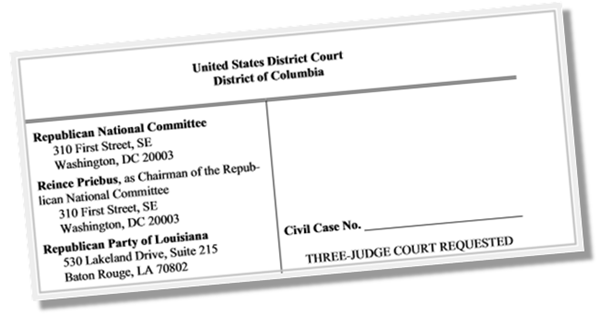
Today, the Republican National Committee (RNC) filed a lawsuit in the United States District Court District of Columbia asking that political parties be able to collect unlimited political contributions for independent expenditures.
In RNC v. Federal Election Commission (FEC), the RNC argues the First Amendment protects the right of political parties to engage in unlimited independent expenditures and accept unlimited contributions to accounts maintained by those parties when designated solely for independent expenditures.
The RNC wants to conduct this independent activity in select U.S. Senate and House Races in 2014 followed in 2016 in the race for the President.
On May 21, a similar lawsuit was brought against the FEC by the Libertarian National Congressional Committee asking for comparable relief.
State and Federal Communications, Inc. provides research and consulting services for government relations professionals on lobbying laws, procurement lobbying laws, political contribution laws in the United States and Canada. Learn more by visiting stateandfed.com.

